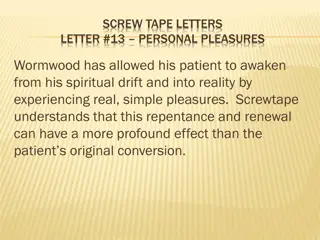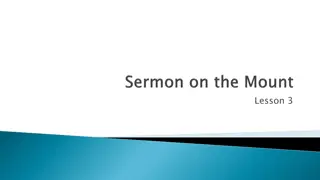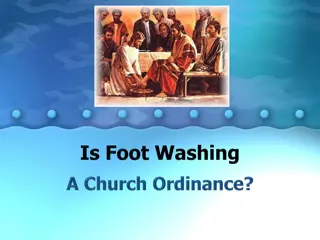
True Apostolic Ministry in 2 Corinthians - Study Overview
Delve into the study of 2 Corinthians, exploring themes of authenticity, humility, and integrity in the apostolic ministry. Discover how Paul addresses deception and arrogance while emphasizing the importance of genuine leadership and communal holiness. Uncover insights on Paul's defense of his apostleship and his deep concern for the spiritual well-being of believers in Corinth.
Download Presentation

Please find below an Image/Link to download the presentation.
The content on the website is provided AS IS for your information and personal use only. It may not be sold, licensed, or shared on other websites without obtaining consent from the author. If you encounter any issues during the download, it is possible that the publisher has removed the file from their server.
You are allowed to download the files provided on this website for personal or commercial use, subject to the condition that they are used lawfully. All files are the property of their respective owners.
The content on the website is provided AS IS for your information and personal use only. It may not be sold, licensed, or shared on other websites without obtaining consent from the author.
E N D
Presentation Transcript
The True Apostolic Ministry The True Apostolic Ministry Honesty Wrapped in Humility Honesty Wrapped in Humility Week 97 24 July 2024
2 CORINTHIANS INTRODUCTION In our continuing study of Second Corinthians, the themes of this letter revolves around both the theological concepts and the practical aspects of Christian living. The primary issue at Corinth was the recognition of authentic ministry and submission to apostolic authority. Paul s corrective was to provide guidance and encouragement as the church navigates the challenges that continue to influence their unity, discipline, and spiritual growth. In our study, Paul emphasizes humility and integrity, and reveals his deep concern for the spiritual well-being of the Corinthian believers. He defends his apostleship, asserts his integrity, and expresses his fear that the church may not be living up to the standards of Christ, then he encourages them to value genuine leadership and strive for personal and communal holiness.
2 CORINTHIANS - LESSON OVERVIEW Swindoll opens by telling us . . . Deception and Arrogance are the things that usually characterize false teachers. Because they have rejected the truth they have to concoct false doctrines and weave questionable narratives. Paul explains they are always learning and never able to come to the knowledge of the truth (2 Tim. 3:7). They oppose the truth and are rejected in regard to the faith (2 Tim 3:8). These imposters proceed from bad to worse, deceiving and being deceived (2 Tim. 3:13). In addition to deception, false teachers exude arrogance. In fact, they lie against the truth (James 3:14). Peter says, Speaking out arrogant words of no value they entice by fleshly desires, by indecent behavior, those who barely escape from the ones who live in error. (2 Peter 2:18).
2 CORINTHIANS - LESSON OVERVIEW Since we understand that the one identified as the Antichrist of the end times will be characterized by a month speaking arrogant words and blasphemies (Rev. 13:5). It should not surprise us that the spirit of antichrist today manifests itself in the same way. So what is the antidote to this devilish deception and arrogance? Honesty and humility! In our lesson, Paul as an authentic minister of Jesus Christ exhibits both of these character traits.
2 CORINTHIANS 12:1114 11 I have become a fool in boasting; you have compelled me. For I ought to have been commended by you; for in nothing was I behind the most eminent apostles, though I am nothing. 12 Truly the signs of an apostle were accomplished among you with all perseverance, in signs and wonders and mighty deeds. 13 For what is it in which you were inferior to other churches, except that I myself was not burdensome to you? Forgive me this wrong! 14 Now for the third time I am ready to come to you. And I will not be burdensome to you; for I do not seek yours, but you. For the children ought not to lay up for the parents, but the parents for the children.
2 CORINTHIANS 12:11-14 In this passage, Paul returns to the subject of his relationship with the Corinthians. False teachers in Corinth had verbally assaulted Paul, but rather than defend the one who invested himself on their behalf, many of the Corinthians said nothing, and some actually sided with Paul s opponents (12:11). Contrary to his usual style, and against his desire, Paul in self-defense, engages in the same kind of foolish boasting that is the hallmark of his adversaries (12:11). As a mark of his authenticity in contrast to the duplicity of the false teachers, Paul points to his willingness to suffer hardship for the sake of gospel (11:23-33). As proof of his authority, he recounts his spiritual journey to paradise fourteen years earlier (12:1-6).
2 CORINTHIANS 12:11-14 Now Paul turns to a specific demonstration of his equality with the most eminent apostles (12:11). Here he argues that he is just as much an apostle as those, the Judaizers were illegitimately claiming as their own. To demonstrate the truth of his apostleship, he points to the signs performed among the Corinthians (12:12). Again he implies that only those truly sent by God in the power of the Spirit could do these things (Heb. 2:3-4). Paul reminds them that during his stay with them they received all of the works of an authentic apostle. All those reading or hearing this letter would instantly remember the miracles the healings, the revelations, the mighty signs that only a true prophet of God could do.
2 CORINTHIANS 12:11-14 It was a powerful and persuasive argument for Paul s authority! Yet at the same time, he sarcastically apologizes that he refused to become a burden to them (12:13). spiritual things in you, is it too much if we reap material things from you? If others share the right over you, do we not more? Nevertheless, we did not used this right, but we endure all things so that we will cause no hindrance to the gospel of Christ. Referring to 1Cor. 9:11-12, Paul says, If we sowed his living expenses for preaching the gospel, but he refused to rely on their support. While other ministers of the gospel did rely on the churches in which they ministered for their support, Paul did not. In other words, Paul had a right to expect them to provide
2 CORINTHIANS 12:11-14 This, Paul says, was the only difference between his own apostolic ministry and that of the Corinthians favorite apostles Peter, James and John. With biting sarcasm, Paul ironically asks the Corinthians to forgive him for not letting them have the full apostolic experience (12:13)! Despite their extremely unkind behavior toward him, Paul still wants to visit them (12:14). How could he overlook their disrespect and disloyalty? Why wasn t he angry and resentful? Because he had deliberately set aside his pride, his ministry experiences had taught him how to handle abuse, rejection, persecution, and hatred.
2 CORINTHIANS 12:11-14 So, he could handle a little Corinthian confusion and waffling. He knew that pride produces anger, resulting in resentment and retaliation. Paul s thorn in the flesh and his confidence in the Spirit s empowerment replaced his pride with humility, and his anger with forgiveness. He didn t have a pristine public image to project or protect; he himself said I m anobody (12:11). He didn t have a greedy desire for material goods; he wanted only a loving relationship with his children in the faith (12:14). Clearly Paul was a man of honesty and humility.
2 CORINTHIANS 12:15-18 15 And I will very gladly spend and be spent for your souls; though the more abundantly I love you, the less I am loved. 16 But be that as it may, I did not burden you. Nevertheless, being crafty, I caught you by cunning! 17 Did I take advantage of you by any of those whom I sent to you? 18 I urged Titus, and sent our brother with him. Did Titus take advantage of you? Did we not walk in the same spirit? Did we not walk in the same steps?
2 CORINTHIANS 12:15-18 Like any loving parent, Paul is willing to give everything he has for his spiritual children, even to spend and be expended for the souls of the Corinthians (12:15). That is Christlike humility! Christ didn t come to be ministered to but to minister to others. He didn t come to be served but to serve (Mk. 10:45). He didn t come to take but to give (Matt. 20:28). Yet, this absolute surrender to the service of the gospel among the Corinthians had led to a gross inequality. Paul had poured himself out for them, but they failed to reciprocate. So, Paul returns to a theme he first introduced earlier in this letter:
2 CORINTHIANS 12:15-18 O Corinthians, our heart is opened wide. You are not restrained by us, but you are restrained in your own affections. Now in a like exchange I speak as to children open wide to use also (6:11-13). Another quality of Paul s honesty and humility is his refusal to take unfair advantage of the Corinthian believers. Everything he did in his conduct remained aboveboard. His words and actions were honest and open. Paul s language, in 12:16, may be designed to directly counter the claims of his critics, who suggested that Paul s honesty and sincerity as well as his sacrificial service to them were all part of an elaborate, cleaver plot to lure the Corinthians in by deceit.
2 CORINTHIANS 12:15-18 False teachers will always twist the simple facts with a complex explanation to make themselves look better and their opponents look worse. Paul refused to take this insidious strategy lying down. So he ask the Corinthians to think for themselves: Had any of Paul s companions, such as Titus or Timothy, ever taken financial advantage of them, even long after they had been reeled in by Paul s alleged trap of deception (12:17-18). Both Paul and his assistants the pioneer church planters and those continuing the work lived by the same standard, walked the same walk, and conducted themselves with honesty and humility during their entire ministry among the Corinthians.
2 CORINTHIANS 12:15-18 So, if Paul had been deceptively fishing for converts to a deceitful fabrication in order to cash in later. Don t you think the hook would have snagged them, or the net would have fallen by now. Yet instead, Paul and his associates continued to live with integrity.
2 CORINTHIANS 12:19-21 19 Again, do you think that we excuse ourselves to you? We speak before God in Christ. But we do all things, beloved, for your edification. 20 For I fear lest, when I come, I shall not find you such as I wish, and that I shall be found by you such as you do not wish; lest there be contentions, jealousies, outbursts of wrath, selfish ambitions, backbitings, whisperings, conceits, tumults;21 lest, when I come again, my God will humble me among you, and I shall mourn for many who have sinned before and have not repented of the uncleanness, fornication, and lewdness which they have practiced.
2 CORINTHIANS 12:19-21 Paul concludes this chapter with brutal honesty regarding his hopes and fears. Though he had been defending his apostolic authority, he had done so not for selfish reasons but, in honesty before God, for the sake of the Corinthians (12:19). Yet he fears that when he comes, he will find the Corinthians still in disarray. That his efforts at confronting their wrong will have fallen on deaf ears, that he will be utterly disappointed to the point of open mourning in their presence (12:20-21). If that were to happen, then they would find an apostle Paul they didn t expect and one they would not like (12:20).
2 CORINTHIANS 12:19-21 They would not find an open-armed father beaming with pride over his children, but they would get a stern- faced disciplinarian ready to deal out justice. From the beginning of this letter, Paul had been trying to preempt such a sorrowful visit. He even wrote, But I determined this for my own sake, that I would not come to you in sorrow again (2:1). What are the things would make Paul sorrowful? He rattles off a brief sampling of what have become typically Corinthian problems: strife, jealousy, angry tempers, disputes, slanders, gossip, arrogance, disturbances, . . . Impurity, immorality and sensuality (12:20-21).
2 CORINTHIANS 12:19-21 Add to this their potential failure to follow through on their promise of financial support for the Jerusalem church (9:3-4), and Paul s visit to them would be nothing short of a disaster! The apostle Paul has made his expectations clear. He has openly shared both his fears and his hopes. He has exhibited complete honesty in a spirit of true humility. Now the ball is in the Corinthians court. Would they pick it up and play by the rules on Paul s team? Or would they pass it to Paul s rivals and join them in their unfair opposition?
APPLICATIONS OF THE LESSON Responding with Honesty and Humility
APPLICATION RESPONDING WITH HONESTY AND HUMILITY In closing Swindollreminds us . . . That in our churches, as in our families, people will hurt us. That is the reality of any close and meaningful relationship built on honesty and humility. In the close-quarters living to which we are called, we can easily offend others, and be easily offended. We can hurt each other s feelings, harm each other s reputations, and break each other s relationships. It would be nice to say that among Christians who genuinely love each other, these things are an exception rather than the rule. But the truth is, the closer we allow ourselves to get to each other, the more the sharp edges of our personalities jab and scrape each other.
APPLICATION RESPONDING WITH HONESTY AND HUMILITY So how should we respond when someone has offended or mistreated us? What do we do when we have been wronged, slighted, or humiliated? Paul s parental response to the Corinthians, who had belittled, betrayed, and berated him, gives us a great example to follow. His model of honesty and humility produces several questions we can ask ourselves. First Is my image a little to important to me? In humility, Paul wrote, I am a nobody (12:11). Can we approach ridicule and mistreatment with the same attitude? Or is our knee-jerk reaction to respond in defense of our reputation? Is responding for the sake of our public image a pursuit of honesty?
APPLICATION RESPONDING WITH HONESTY AND HUMILITY Second Am I falling into the trap of keeping score? Paul said he wouldn t take a penny from the Corinthians (12:14). He had given sacrificially but never demanded or expected anything in return. In fact, he remained willing to spend and be expended for their sakes. Though they should have responded with love and respect, he did not make that a condition for his love for them. Are your own relationships built on a give-and-take desire for equality, or are you willing to give repeatedly, even if you see no signs of a return on investment? Third Do I flatter other people for my own advantage? Paul made it clear that he never took advantage of the Corinthians either personally or through his representatives (12:16-18).
APPLICATION RESPONDING WITH HONESTY AND HUMILITY He didn t say or do just enough good to string them along in fake friendships, only to load them down with a list of hefty demands. He didn t have ulterior motives when dealing with the believers in Corinth. People with such motives engage in flattery, not friendship. Friendshipdoesn t try to manipulate other for personal gain. As we try to develop authentic, vulnerable relationships with those in our church family, it is wise to do so with honesty and humility. And when our brothers and sisters in Christ inevitably let us down, we need to remember Paul s characteristics of Christlike love.
NEXT CLASS 31 July 2024 Before next class, read the below chapters in the KJV and in one other versions of the Bible, i.e., NIV, NRSV, TLB, CEV, etc Chapter 13:1 14 Passing The Test Faith






















